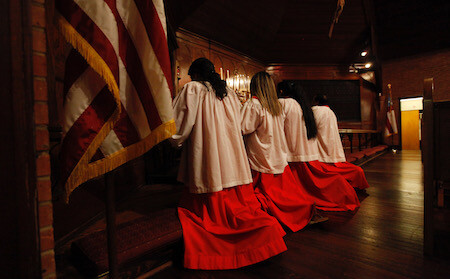Getting Ready for Sunday by the Rev. Fabian Villalobos

Eight Sunday after Pentecost, Proper 12 Year A
Romans 8:26-39; Matthew 13:31-33, 44-52
The Spirit helps us in our weakness; for we do not know how to pray as we ought, but that very Spirit intercedes with sighs too deep for words. And God, who searches the heart, knows what is the mind of the Spirit, because the Spirit intercedes for the saints according to the will of God.
This is the reassurance that God is always there for us; He is really the Emmanuel, God with us, who maintains His promise and supports our prayer life to keep us in communion with Him in a way that no words can express.
These verses are also a reminder that we humans are weak and have moments of weakness. That there are moments in life when we don’t know how to pray and yes, it is in those moments when the Spirit intercedes for us. God searches and knows the heart of all.
Perhaps now that we know the faithfulness of God and His presence from these verses, we are able to accept and understand better this verse from Romans Chapter 8,
We know that all things work together for good for those who love God, who are called according to his purpose.
Circumstances and situations we dislike or don’t want to accept; moments in life where pain, sorrow, discomfort, or despair take over our lives; moments where we search without finding meaning or blessed moments we can’t explain- we know everything that occurs is connected in one way or another with the divine providence of God.
All things, all moments, all events and people, all that happen, work together for good. “Even the hairs of your head are all counted” (Mt 10:30). God is always in control. Things we understand or are beyond our understanding, at the end, will find purpose and reason to be in the eyes of God.
The fact that God helps us in our weaknesses and that all things work together for those who love God prove His involvement and compassion for us and our human history. When we continue reading Paul’s letter to the Romans for this Sunday, we hear that our faith and communion with God in Jesus is guaranteed.
If God is for us, who is against us? …Who will separate us from the love of Christ?
For I am convinced that neither death, nor life, nor angels, nor rulers, nor things present, nor things to come, nor powers, nor height, nor depth, nor anything else in all creation, will be able to separate us from the love of God in Christ Jesus our Lord.
The only obstacle God could find is our closed heart; from God’s perspective He is always going to offer us a communion. There is a permanent place for us in His sight and nothing that happens outside ourselves could break the covenant of love in Jesus that God has establish with us.
God’s faithfulness and compassion is a disarming offer in front of our human weakness of sin and limitations. His presence in our lives represents the truth that our heart is constantly seeking.
His Kingdom is well above all we can imagine or understand, as Jesus mentions in today’s Gospel:
The kingdom of heaven is like a mustard seed....is like yeast....is like treasure hidden....is like a merchant in search of fine pearls....is like a net that was thrown into the sea...
All these images of the Kingdom confirm what Paul had stated before, “all things work together for good for those who love God.” A Kingdom of possibilities and opportunities is accessible for us through our Baptism; not only we are children of God; we are also heirs of His Kingdom.
The Rev. Fabian Villalobos
Rector, Christ Church, Dallas



